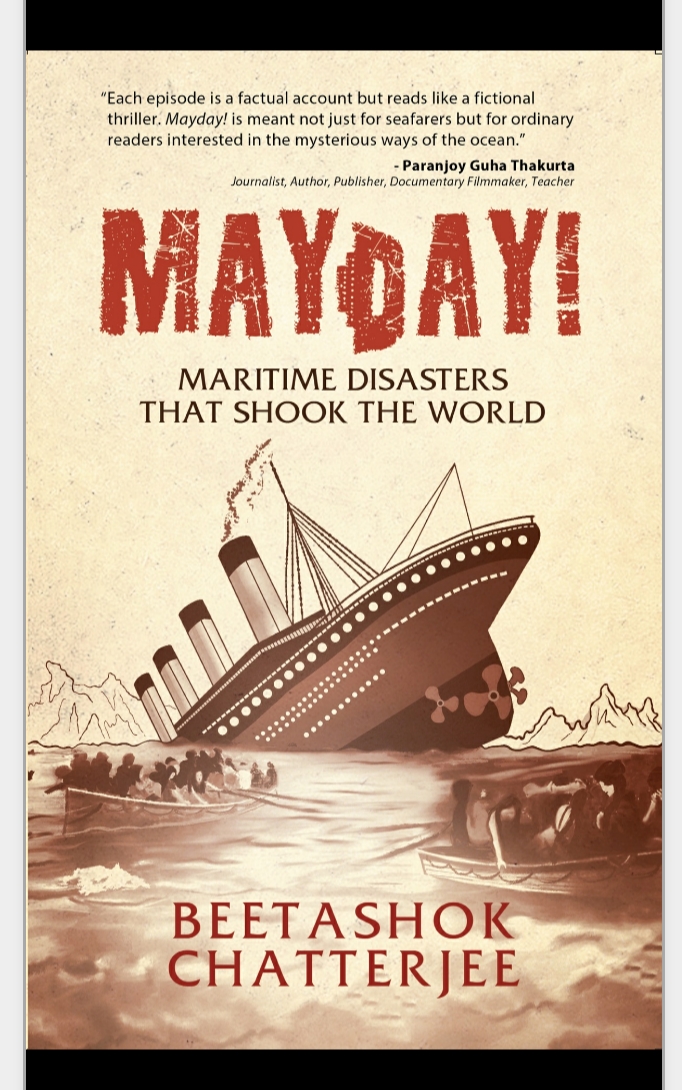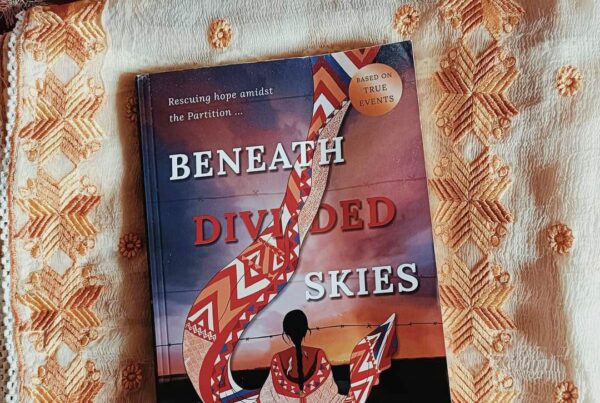This review was first published in The Wise Owl literary magazine as a featured article in their special Book Review Supplement on 10 August, 2023.
Link: https://www.thewiseowl.art/mayday-by-beetashok-chatterjee
Book: MAYDAY!
Author: Beetashok Chatterjee
Genre: Non-fiction
Length: 220 pages
“There is something infinitely sad about shipwrecks. Whether destroyed by the forces of Nature or by human folly, every wreck has a story to tell.”
The opening sentences of Captain Beetashok Chatterjee’s latest offering MAYDAY! are steeped in a sense of foreboding, danger, and loss, and set the mood for what follows. Published by Readomania, the book is a collection of real-life civilian maritime disasters that shook the world and changed the face of seabound travel and commerce, in more ways than one.
The monosyllabic title – iconic, no-fuss, using a jagged font in red – symbolises distress. The stories are thirteen in number, further stirring a sense of intrigue and portent in the reader’s mind.
Documenting real events into a literary non-fiction has always been a daunting task. A single click on Google and the reader has a tsunami of information, as it were, at his fingertips. Hence, it takes literary mettle, understanding and a deep sensitivity to compile bare facts and present them as an intelligent and gripping page turner. And that is precisely where Beetashok Chatterjee’s masterful narration comes in handy. Although one has an inkling of the outcome of each story, Chatterjee succeeds in keeping the reader hooked right till the end.
Arranged in a chronological order, the reader is treated to thirteen diverse maritime situations – from 1872 to 2014, from the familiar shores of Kerala to the remote seas of Portsall or the far-flung island of Leyte. Whether the vessel hit an iceberg, ran into a sandbar or burst into flames, the devastation has always been colossal. And the loss, heartbreaking.
Among the thirteen stories, one that resonates the most with us is probably that of the Titanic, for obvious reasons. But as a reader, what I found particularly heartwarming were the fascinating details that Chatterjee has included here — the VIP guest list, the wide variety of professionals catering to the needs of all on board, the deeply moving scenes of their last living moments, an utter disregard for rules, and a misplaced optimism that eventually sounded the death knell of this magnificent carrier.
Captain Chatterjee has bolstered each story with a body of carefully curated details that paints a vivid, life-like image of each accident. The reader can effortlessly hear and visualise the breaking of the carrier parts, the agonised cries of the crew and passengers, the unbridled sea water whooshing in, the raging fire engulfing man and machine, and finally, the accumulated debris waiting to ‘rust in peace’ deep down on the ocean floor. The vocabulary is simple and restrained, yet evocative and impactful, aligning with the theme. The impressive illustrations prove to be a useful prop in this.
The forbidding, unpredictable seas operate in mysterious ways, often challenging human faculties and questioning technological acumen. How else does one explain the secret behind the deserted Mary Celeste bobbing upon the waves, all by itself? Or the complete disappearance of the Kairali with no trace of even its debris? Reading about such incidents makes us shudder and reinforces our belief in the invisible hand of God.
A striking feature of this collection is the display of abiding human emotions and values, even in the face of extreme adversity. Chatterjee has cited multiple examples of empathy, compassion and heroism shown by mariners, passengers, and also bystanders, often disregarding their own safety and chance of escape. Andrew Parker and Brian Bunker selflessly helping people move out of the capsized Herald of Free Enterprise, the smaller passing vessels rallying around the marooned Estonia, Captain Mangouras trying to salvage the doomed Prestige, the services rendered by the first responders on shore – all point to the triumphant human spirit.
While we extol such enduring acts of kindness, our hearts go out to the survivors and the kin of the unsuspecting victims who are, till today, looking for answers. Human complacency or ‘hubris’, as Mr Bee calls it, has been that one extrusive factor that contributed to most of these mishaps. Captain Chatterjee, with his laudable seafaring experience and expertise, has offered incisive analyses, inputs, and inferences on each of these accounts. Be it the debate between Pilots and Masters in Mont Blanc, the slipshod investigation of the Kairali, the delayed communication and decision-making in Amico Cadiz, a criminal oversight in the Herald of Free Enterprise, gross overloading aboard the Dona Paz, or the inadequate response in case of the Estonia. While ill-advised man-made geo-political policies catalysed the Le Joola tragedy, the ageing Prestige was done in by foolhardy cost-cutting measures. Chatterjee’s accounts are a discerning commentary on maritime laws, the lack of accountability, human greed, selfishness, negligence and administrative corruption.
Concern for the environment forms another pivotal theme of this collection. Most maritime incidents leave behind a mammoth spillage of fuel, metal, chemicals and cargo, adversely impacting countless species of aquatic flora, fauna, and the quality of seawater. The livelihood opportunities of thousands stand impaired. The dismemberment of the Torrey Canyon, the Amoco Cadiz, the Exxon Valdez, and the Prestige, bear testimony to such ecological disasters.
The one account that has impacted me the most is the Sewol disaster in which around 250 school students died, only because they were used to obeying instructions and hence, did not try to escape. The facts, and the narration, have both left me moist-eyed. The harrowing final paragraph will stay with me for quite some time.
The only downside of this book, I feel, is an occasional overload of maritime jargon, and minute details of distances, measurements, angles, places, and timings that, at times, impede the reading tempo.
MAYDAY! is not just a compilation of factual pelagic events. It chronicles human emotions and foibles; teaches us enduring life lessons; talks about mechanical goliaths perishing before nature’s fury; sensitively documents the unheard pleas of obscure communities; and most importantly, it gives us, the land-bound readers, a peek into the bottomless, enigmatic seas and the secrets that lie buried in their womb.
Certainly recommended for an engaging and immersive reading experience!









